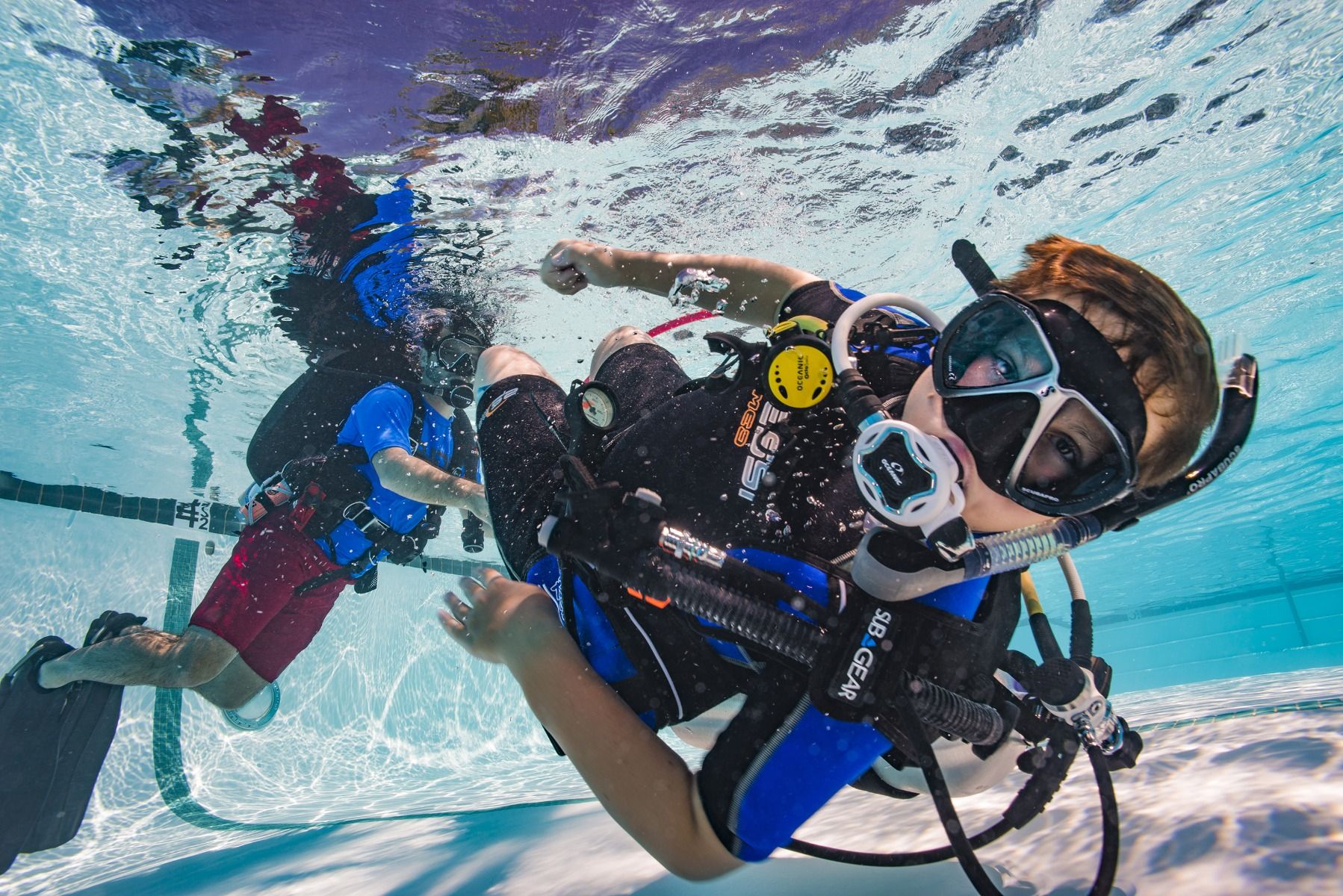Scuba diving and underwater rugby are two sports that require a scuba tank. [120 words] Scuba diving is a popular recreational activity that involves exploring underwater environments while wearing a self-contained underwater breathing apparatus, or scuba tank.
Divers can experience the beauty of coral reefs, shipwrecks, and marine life up close. On the other hand, underwater rugby is an exciting team sport that combines elements of rugby, swimming, and diving. Players wear scuba gear and use a weighted ball to score goals underwater.
Both of these sports provide unique opportunities to enjoy the underwater world and require the use of scuba tanks to ensure participants have a constant supply of air while submerged. Whether you are an avid diver looking to explore beneath the surface or someone interested in an unusual and challenging team sport, scuba diving and underwater rugby are great options that incorporate the use of a scuba tank.

Credit: en.wikipedia.org
Extreme Sports That Require A Scuba Tank
Looking for an adrenaline rush like no other? Engaging in extreme sports that require a scuba tank might just be the answer. These thrilling activities take scuba diving to the next level, pushing the boundaries of exploration and adventure. If you’re ready to take the plunge, here are three awe-inspiring extreme sports that require a scuba tank:
Cave Diving
Bold adventurers seeking an unparalleled thrill often turn to cave diving. Unlike traditional scuba diving, this heart-pounding experience takes place in underwater caves, where divers must navigate through narrow passages and explore hidden chambers.
Cave diving requires excellent buoyancy control, advanced navigation skills, and the ability to remain calm in challenging environments. As divers glide through the crystal-clear waters, they are treated to breathtaking geological formations and the chance to encounter unique cave-dwelling creatures.
Although cave diving offers an incredible sense of exploration, it demands meticulous preparation, specialized equipment, and advanced training. The risks are high, but the rewards are even greater.
Ice Diving
Ice diving is an extreme water sport that attracts brave souls who welcome the cold embrace of winter. As the name suggests, this thrilling activity involves diving below the icy surface of frozen bodies of water.
Beneath the frozen exterior lie stunning ice formations, often illuminated by sunlight filtering through the thick ice above. Divers have the opportunity to witness a surreal underwater world, where the tranquility and stillness create an unforgettable experience.
However, ice diving poses unique challenges. Thick ice layers and limited visibility can make navigation difficult, and the extreme temperatures demand careful consideration of equipment and safety procedures. But for those who dare to dive into icy depths, the reward is an adventure like no other.
Wreck Diving
For history enthusiasts and adventure seekers alike, wreck diving provides a captivating glimpse into the past. Exploring submerged shipwrecks is a thrilling experience, full of mystery and discovery.
Wreck diving offers the chance to swim amidst remnants of bygone eras, witness the haunting beauty of decaying vessels, and encounter marine life that has made these artificial reefs their home. The excitement of penetrating through shipwrecks and uncovering hidden artifacts only adds to the allure of this extreme sport.
However, wreck diving carries its own set of risks, including potential entanglement and the need for proper training to navigate through tight spaces. But for those who crave adventure and a connection to history, the underwater world of wreck diving holds endless treasures.

Credit: www.facebook.com
Safety Considerations And Precautions
When it comes to sports that require a scuba tank, safety should always be the top priority. Engaging in any underwater activity can present unique risks, which is why taking proper precautions is essential. By following the right safety measures, both professional and recreational divers can minimize the chance of accidents and ensure a safe and enjoyable experience.
Proper Scuba Diving Training
Before venturing into any underwater sport that involves a scuba tank, it is crucial to undergo proper scuba diving training. This training arms individuals with the necessary knowledge and skills to handle the equipment safely and confidently. Seeking guidance from experienced instructors and obtaining certifications from recognized diving organizations is highly recommended.
Proper training ensures that divers are well-versed in various diving techniques, understanding the importance of factors like buoyancy control, decompression stops, and emergency procedures. By familiarizing themselves with these critical aspects, divers are better equipped to navigate potential challenges while staying safe underwater.
Equipment Maintenance And Inspection
To ensure a safe scuba diving experience, it is essential to prioritize regular equipment maintenance and inspection. Divers must always inspect their gear before each dive, checking for any signs of damage or malfunction. Inspecting the scuba tank, regulator, BCD (buoyancy control device), and other equipment components is imperative to ensure optimal performance.
Maintaining equipment integrity includes cleaning and rinsing gear properly after use, and storing it in a dry and secure environment. It is also crucial to adhere to the manufacturer’s guidelines for servicing and replacing parts. By practicing these maintenance routines, divers can minimize the risk of equipment failure and ensure that their gear functions reliably throughout their dives.
Proper Planning And Communication
Proper planning and effective communication play a vital role in scuba diving safety. Before embarking on a dive, divers must plan their route, taking into account factors like depth, current, temperature, and visibility. Understanding the dive site and assessing potential risks beforehand allows divers to make informed decisions and prepare accordingly.
Communication is key, especially when diving with a buddy or within a group. Establishing clear dive signals and discussing a communication plan beforehand ensures that divers can effectively communicate underwater. This enables them to stay in sync, provide assistance when needed, and alert others in case of emergencies.
Additionally, maintaining regular contact with the surface support team, if available, is crucial for added safety. Reconfirming dive plans and having a system in place for emergency communication can help expedite response times and ensure a swift rescue, if ever needed.
By prioritizing proper scuba diving training, equipment maintenance, and planning with effective communication, divers can enjoy sports that require a scuba tank while minimizing potential risks. Remember, the underwater world offers unparalleled beauty and excitement, but only by adhering to these safety considerations can you fully immerse yourself in its wonders.
Can Swimsuit-Based Sports Transition into Extreme Scuba Adventures?
Transitioning from traditional sports that need a swimsuit, like swimming or water polo, to extreme scuba adventures introduces a thrilling shift in water-based activities. While the core gear changes, the skills, endurance, and love for the aquatic environment remain essential, proving these swimsuit-centric disciplines can lay the foundation for underwater exploration.
The Thrill And Rewards
Engaging in sports that require a scuba tank can offer unparalleled thrills and rewards. From the sense of exploration and adventure to the unique underwater experiences, these activities provide a remarkable opportunity to dive into a world that few get to witness. Additionally, these sports contribute to the preservation of marine ecosystems, making them not only thrilling but also responsible choices for thrill-seekers.
Sense Of Exploration And Adventure
Imagine yourself descending into the depths of the ocean, surrounded by the mystery of an underwater world. Scuba diving and other sports that require a scuba tank offer a sense of exploration and adventure that is hard to match. As you immerse yourself in the depths, every dive becomes an opportunity to uncover hidden treasures, discover breathtaking marine life, and witness awe-inspiring natural formations.
Unique Underwater Experiences
Scuba tank sports provide access to a range of unique underwater experiences that are simply unforgettable. Whether you are exploring vibrant coral reefs teeming with colorful fish, encountering majestic marine mammals like dolphins and seals, or discovering fascinating shipwrecks resting on the ocean floor, each dive offers a once-in-a-lifetime encounter. These experiences create lasting memories and inspire a deep appreciation for the wonders of the underwater world.
Preservation Of Marine Ecosystems
One of the remarkable aspects of sports that require a scuba tank is the emphasis on the preservation of marine ecosystems. By participating in these sports, enthusiasts actively support the conservation and protection of underwater environments. Divers are often conscious of their impact on marine life and are committed to maintaining the delicate balance of these ecosystems. Through responsible diving practices, such as coral reef awareness and marine species conservation, scuba tank sports contribute to ensuring the longevity and well-being of these precious natural habitats.

Credit: www.diverightinscuba.com
Frequently Asked Questions For Sports That Require A Scuba Tank
What Sports Can You Do With A Scuba Tank?
Scuba diving is the most common sport that requires a scuba tank. Other sports include underwater hockey, underwater rugby, and synchronized swimming.
Can You Use A Scuba Tank For Swimming?
No, you cannot use a scuba tank for regular swimming. Scuba tanks are designed specifically for underwater activities that require longer periods underwater and deeper dives.
Are There Any Sports Where Scuba Tanks Are Mandatory?
Yes, scuba tanks are mandatory for certain sports like technical diving, cave diving, and deep diving. These sports require specialized training and equipment due to the increased risks associated with deeper dives.
What Are The Benefits Of Using A Scuba Tank In Sports?
Using a scuba tank allows athletes to explore underwater environments, extend dive times, and reach greater depths. It also provides the necessary air supply for breathing underwater, ensuring safety and comfort during sports activities.
Conclusion
Participating in sports that require a scuba tank can lead to exhilarating and unforgettable experiences underwater. These sports, such as scuba diving and underwater hockey, offer unique challenges and opportunities for adventure. By exploring the depths of the ocean, enthusiasts can witness breathtaking marine life and explore hidden underwater treasures.
So, if you’re seeking a thrilling and immersive sporting experience, donning a scuba tank can open up a whole new world of excitement.






